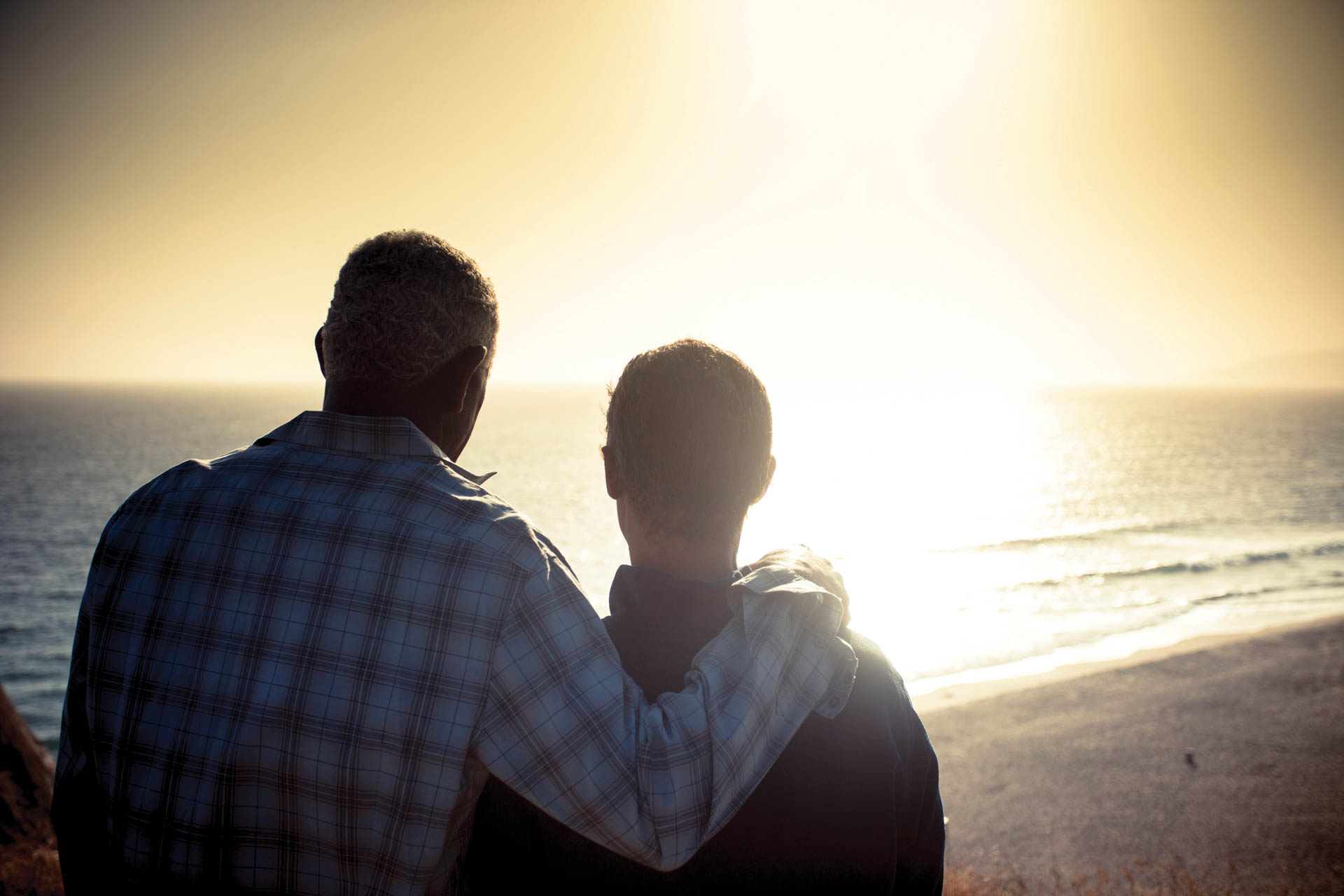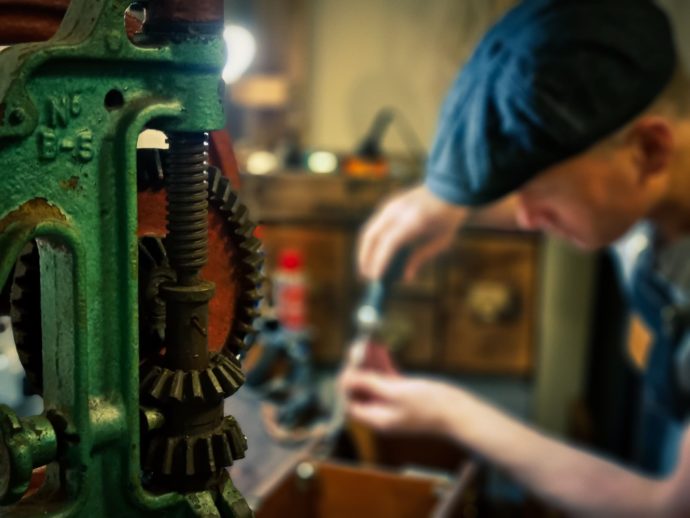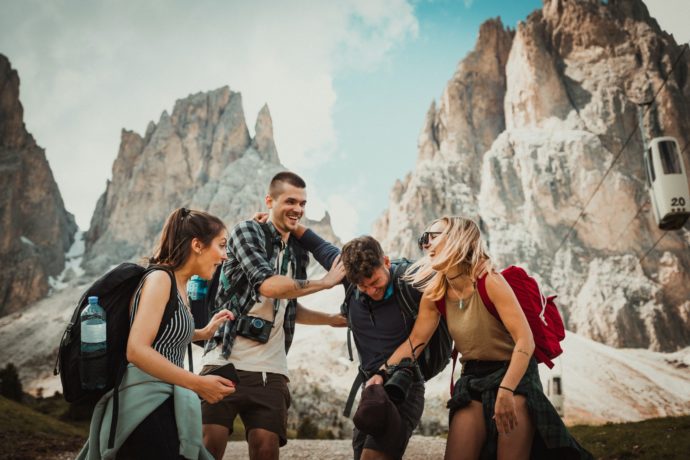
Old, young. Married, single. Life stages are shaping our perspectives on the COVID-19 crisis.
In my second Kitchen Table Chat on Tuesday, April 7, we discussed these varying dynamics, what they mean and how to deal with them. You can see it all below. And hopefully you can join me next Tuesday for another session.
VIDEO TRANSCRIPT BELOW:
Welcome again to this Kitchen Table Chat! You are literally in my kitchen. You can see the stove and the dish towels, and it seemed like this was the right environment to have a conversation about our relationships. Which is what this is about, and the title of today’s chat is how life stages shape our views of the pandemic and our relationships, so introducing myself again.
I’m Robert Waldinger, I’m the fourth director of the Harvard Study of Adult Development. It is the longest study of adult life that’s ever been done, as far as we know. It’s followed the same people from the time they were teenagers in the 1930s all the way into old age into their 90’s. Now we’ve followed their children who are middle-aged. The big question that the study asks is what keeps us healthy and happy as we go through our lives?
Our study has a lot to teach us about just what’s happening now in all of our lives: there is so much uncertainty, really a sense of crisis. Many of our original research participants went through big crises, the Great Depression, World War Two, all the social upheaval of the 60s and the Vietnam War, so they have a lot to teach us about how we stay healthy and happy when we go through hard times.
One of the things that the study keeps teaching us over and over again is that our relationships with each other turns out to be one of these strongest predictors of what is going to keep all of us happy and healthy. In fact, this was information that we didn’t quite believe when we started finding this in our data.
How could our relationships with other people keep our bodies stronger and healthier as we got older? How could they actually predict that we were gonna live longer?
It turned out to be the case; many other studies have found the same thing today. We want to emphasize that relationships are our most precious resource to see our way through a crisis. It’s unlike anything most of us have ever lived through one of these things. It was wonderful last time that over a thousand people tuned in live! Some watched the video of this chat afterward, but more than a thousand people said, yeah, we need this kind of conversation about our relationships!
Here we are again; feel free to share this link with anybody who you think would be interested. The recording will be available on this YouTube channel. Later on, you can also subscribe to the YouTube channel. You can connect on Twitter @RobertWaldinger, or you can go to the website of our foundation Lifespanresearch.org. There are lots of ways to connect and lots of ways to have this conversation together!
Last time you all answered some important questions to ask about what’s happening right now for all of us.
What is your biggest concern right now?
The first thing we asked people to respond to, what is their biggest concern right now? And no surprise, over a third of people, said that family was the biggest concern; 35% of people said my family is what I’m most concerned about.
Health was slightly less, 28%, of people, were concerned about health. Understandably fewer people, about one in five, were concerned about their jobs, although I bet that has increased over the week. 15% were worried about isolation. Not surprising that family and health are the top choices in our concerns. Today we’re going to ask you some follow-up questions, so if you take your cursor and you move, I think to the top right of your screen, you’ll see a letter “I.” If you hover the cursor over that I some questions will drop down, so please, if you can answer those questions, and then I’ll report back about what we’ve all said about these concerns of ours right now.
THE SECOND QUESTION THAT WE ASKED LAST TIME THAT I’M REPORTING BACK ON NOW IS, WHAT’S YOUR BIGGEST CONCERN IN YOUR RELATIONSHIPS, RIGHT NOW?
Those were the top concerns; one was how do I balance risk and connections with other people? One in three people said that was their biggest concern, and almost one in three said that separation from key people was important and was their biggest concern. It was being separated from people that they’re usually able to be with in real time.
These are very strange times because we have this unusual situation. We are disconnected from many people we feel very close to and want to stay connected with physically. Still, we’re also more connected to each other in some ways than we’ve ever been before. In some ways, we have too much closeness; many of us are at home all day long with people who are not usually at home all day, with people who go out to work all day. Or kids go out to school or are in childcare, suddenly some of us are in households where we are more together than we’ve ever been.
Feeling like, oh, we didn’t sign up for this much togetherness, so at the same time that many of us feel too isolated!
MANY OF US FEEL LIKE WE DON’T HAVE ENOUGH SPACE, AND ONE QUESTION IS; WHAT ARE SOME OF THE SOURCES OF FRICTION THAT COME UP?
When we are bumping up against each other more, one of the sources of conflict in relationships that we’ve noticed in our study of people as they go through their whole lives is a conflict in perspective. Our perspective on what’s important in life changes as we go through life. Where I am in my life and how much of my life I’ve lived, and how much I feel like I have yet to live. Those questions shape how I view what’s important, and I think they also shape how we see the pandemic.
WHAT DO I MEAN BY THIS, WELL LET’S DO A THOUGHT EXPERIMENT TOGETHER; FIRST, THINK ABOUT HOW OLD YOU ARE NOW AND THEN DIVIDE YOUR AGE IN HALF. THINK ABOUT YOURSELF AS YOU WERE WHEN YOU WERE HALF THIS AGE? WHAT WAS IMPORTANT TO YOU BACK THEN? WHAT DID YOU CARE ABOUT THE MOST, AND WHAT’S IN YOUR LIFE THAT WASN’T IN YOUR LIFE?
If I think about my own life half a lifetime ago, I hadn’t become a parent yet. I was just starting in my career and wondering what I was gonna do. Where I was gonna go in my career, wondering about a very new intimate relationship. I had just gotten married that shaped how I saw my life, how I saw the world, and what was most important, my career and my new relationship. Those were the biggest things in my life right now; my view of life is very different. With a lot of my life is behind me, I’m more worried about the younger generation. Now, these differences in perspective as we get older actually can make us feel like people of different generations just don’t get it; they don’t understand what’s most important.
Let’s stop for a minute and just think about how different the world looks at different ages, so I’ll give you an example about my daily walk. I take a daily walk, and the other day I saw some middle schoolers on my walk, and they looked like they were having a great time, but they were too close to each other. I was worried about their social distancing and whether they were gonna spread the virus. I found myself getting kind of judgmental. Middle schoolers are these young people who are just discovering the joys of peer group friendships. They so want to be together!
Think about the difference between a teenager who is just spreading her wings and wanting to be with other kids! How cooped up, she must feel, now with the pandemic?! Think about the difference between that teenager and a three-year-old who’s used to going to daycare but now gets to be with parents all day long. He can feel like a great big party, and of course, the three-year-old doesn’t understand worry and anxiety going on. Think about the young adult, the person in their 20s who’s just trying to launch a career, maybe getting their first job or trying to get their first job, at a time when suddenly so many jobs are going away, or at least are being put on hold. Or think about people who’ve just started in a romantic relationship, and they’re now separated from the person they’ve just started to become involved with.
For that young adult in their 20s, it can seem like the most important things in the world are out there and need to be tended to. Think then about somebody in their 40s, somebody we often call a person in the Sandwich Generation. Someone who has got young children at home, and so they’re involved in doing childcare, but they’re used to the kids being out at school all day. Suddenly, the kids are at home, need schooling, need care, and need monitoring.
Suddenly there’s more income pressure because of a family where there were two incomes; there might now only have one income. Income might be reduced, so there are financial pressures along with new childcare pressures. When we’re in middle age, many of us have aging parents who suddenly were worried about because those parents are the most vulnerable to the worst effects of this pandemic. Many middle-aged people with older parents find themselves becoming helicopter children; they’re monitoring their parents vigilantly to make sure their parents aren’t doing anything dangerous.
Okay, let’s move to the person in their 70s, somebody who might still be quite active and used to being out there in the world and now trying to balance connection with risk. My colleague, who’s a physician trying to balance in the hospital taking care of her patients and staying at home, takes care of her husband, who has dementia. Now let’s think about our friends and our relatives who are in their 90’s who might be living in retirement homes. How about those people for whom having visitors is what they live for? Suddenly they’re being told they can’t have visitors! They may be saying life isn’t worth living if I can’t have my family and friends come to see me.
WHAT DO WE DO IN THE FACE OF ALL THESE DIFFERENT PERSPECTIVES THAT PEOPLE BRING TO US? THE FIRST THING TO REMEMBER IS THAT NOBODY IS WRONG NONE OF THESE PERSPECTIVES ARE WRONG. WHAT THAT MEANS IS THAT IT IS OUR JOB TO LISTEN TO EACH OTHER AND TO TRY TO UNDERSTAND THE POINTS OF VIEW OF PEOPLE IN DIFFERENT GENERATIONS.
Help them find solutions if a teenager is desperate to be with friends; help them find ways to do this virtually. Find more creative ways to hang out together or have parties, even if it’s over video chat. The important thing is not to make anybody feel ashamed of what they’re most worried about and what they’re most concerned about. We’re all doing the best we can. We don’t want to be asking each other why we can’t be different. Instead, we want to empathize with these different points of view, help each other find solutions, and help each other remember what goals we share in common.
We all share in common that we want to emerge from this crisis healthy and strong, which means that if we keep our physical distancing now if we don’t take risks. If we do wear masks when we go out, if we do all those things that the CDC and our medical experts are telling us to do, then we will emerge on the other side of this. So that the teenagers can get back to seeing their friends. The four-year-olds can get back to preschool, and we’re all out there back in our worlds doing the things that we care about.
We’re asking some different questions, and I’d be grateful if you’d take your cursor up to the top of your screen, hover over to see the questions, and give us your answers, and then I’ll report back. Before we move into our question and answer time, which will be most of our time together today, I’d like to draw a little inspiration from one of my heroes.
As you know, Mr. Rogers or Fred Rogers had a children’s program for decades and what was revolutionary about what he did is he talked to kids honestly about difficult things. He talked about death; he talked about complicated feelings; he talked about conflicts in relationships and emphasized that nobody was wrong. He helped support kids in having the sense that they felt and in being themselves, so as we go into this question and answer period, here’s a quote from Mr. Rogers.
In times of stress, the best thing we can do for each other is to listen with our ears and our hearts and to be assured that our questions are just as important as our answers.
I love this quote because, in his simple language, Fred Rogers is reminding us that we don’t need to know all the answers. We can’t know all the answers that there’s huge uncertainty in our lives and that we can live with that. What we can do is help each other manage the uncertainty as best we can. I would be grateful if you would share your insights and share your questions, and I’ll share your insights on the video and try to say a bit about some of the questions you raised.
First of all, I’m seeing people on this chat from as far away as Brazil and Portugal and Turkey and Italy! It’s great to have all of you and certainly the many people from different parts of the United States! Ah, the other thing you should know right now is I’m learning the polls program; questions are only available if you refresh your screen. If you go up to the top and that the little circular arrow is if you click on that refresh the screen, it will come back up. The poll questions will be there so, please do that.
HERE’S A QUESTION FROM RENEE. HOW CAN WE KEEP AN EYE ON OUR TEENAGE DAUGHTERS AND LOOK FOR SIGNS OF ISOLATION? I HEAR IT COULD GET BAD; WHAT SIGNS ARE WE LOOKING FOR? WHAT DO WE SAY TO THEM? HOW DO WE CHECK ON THEM?
It’s such an important question because, on the one hand, our kids don’t want to be micromanaged when they’re teenagers. They’re just trying out their independence; they need their space on the other hand; on the other hand, we don’t want to leave them alone. We don’t want them to be too much on their own if they are becoming depressed or if they are becoming dramatically anxious or upset in different ways.
Signs of isolation are the usual ones to look for in your child or any relative. Are they not responding to you the way they usually do? Do they look more sad, or do they look more anxiously talk? If they’re keeping to themselves and not coming out of their room, make sure that you check in more than once a day. See if they can come out of their room they don’t have to talk to you. If you’re not the person they want to talk to, but they need to be talking with somebody. The helpful thing is to get our teenagers and all of our kids and ourselves to follow some routines. What that means is we want to eat and sleep at regular times, have regular mealtimes to the extent possible, regular bedtimes times both going to sleep and getting up in the morning.
REGULAR SCHEDULES WILL KEEP OUR MOODS BRIGHTER AND KEEP OUR CIRCADIAN RHYTHMS MORE STABLE.
In addition, make sure that we are talking to each other, making sure that people are checking in with people that they care about. If you are worried about someone, ask about it. If you’re concerned that somebody might be feeling like they want to harm themselves, ask about that too. You will never put that idea into someone’s head, so I’m accustomed to asking people if they have begun to feel like life isn’t worth living and if they do feel that way, talk about it. You will not make it worse; you will only make it better, so don’t leave people too alone. Check on them but at the same time, make sure that they’re allowed to have their space when they need it.
ANOTHER QUESTION FROM LOUISE, HOW CAN WE MAKE OUR ELDERS FEEL MORE CONNECTED TO US SAFELY?
It’s a really important question because our elders are the people we would like to come and gather around right now or bring them to us. In many situations, we can’t do that, so the way we make them feel connected is to check in frequently, have video chats going if you have access to a video chat platform. Get them help if they cannot access a video platform. Talk on the phone, keep the phone chat going and take them through your day with you. As you cook a meal, talk with them, leave the phone on speaker and just talk while preparing dinner. Remind them of things they like to do and check up on whether they’re doing those things. Help them remember things that they might be able to watch on television or listen to on the radio. Also, remind them not to spend all their time listening to the news or watching the news. It makes us all anxious, and so we want to have limited doses, where we get the correct information, but we don’t take in too much. It is particularly important for older people at home and may be used to watching television all day. This is not the time to watch television news; it is agitating and disturbing.
HERE’S A QUESTION FROM KATY, “MEDICAL PROFESSIONALS AND OTHER FRONTLINE WORKERS WHO ARE NOT GETTING THE NOURISHMENT OF FAMILY SUPPORT BECAUSE THEY HAVE TO SELF-QUARANTINE WHILE THEY PROVIDE A PUBLIC GOOD; HOW CAN WE SUPPORT THEM?”
Katy, this is near my heart, I’m a physician, and many of my colleagues are in these situations where they go to work every day. They put on protective equipment they work with infected people, which is exactly what we need them to do, but they have to come home and have to self-quarantine to keep their own families safe. Just like Louisa was asking about with our older family members and friends, we keep those people connected. If someone has to stay in their room and leave their meals for them, that we don’t get to eat meals with them, let’s eat meals together virtually! If they can have a video screen on and eat with us while we’re in the kitchen eating, let’s do that! Let’s have family routines where the quarantined person is still with the family to the extent that she or he can be!
The other thing we want to do with workers who are healthcare workers or grocery store workers, or delivery people is to ask them to tell us in detail about their day. We need to let them talk about what they’ve been seeing and hearing because sometimes what’s gonna be part of their story about their day is upsetting, particularly people on the front lines of health care. They’re going to see upsetting things; then you’re going to need to talk about it. Now, we don’t want them talking about upsetting things up in front of small children. Let them talk about it with you if you’re another adult, and you can listen. It may be hard to hear, but it is one thing you can do to support the people out there. They are doing very difficult and sometimes traumatic work. It’s a really important question!
WHAT ARE THE MOST IMPORTANT THINGS THAT PARENTS SHOULD BE DOING RIGHT?
Now well, of course, the first thing is keeping everybody safe. Still, really important thing is to listen to try to pay attention to what children are doing saying. Think about asking them; try to connect with them around the things that they’re interested in. It might be a video game; it might be a cat video, it might be something funny somebody shared with them on the Internet. Use your child’s interests as a way to talk about bigger things, like how scary it might feel not to know what’s happening in this crisis. Bigger things start with small things that are interesting, funny amusing to your child and go from there into deeper conversations—listening well and connecting around your child’s interests. Maybe one of the best things you can do is share stories about hard times in your life. How you got through them, how you came out the other end, and everybody was okay. If they were so again, children need a perspective that hard times come, that we pull together that we get through them, and we come out the other side together.
HERE’S A QUESTION FROM JOE REGULAR; SCHEDULES KEEP US STABLE IS THIS ALSO A GOOD TIME TO DO OR START SOME NEW THINGS?
Joe, that’s a great question! I’m a person who likes new things, so for example, I started this video chat. Which is, in some ways, a little scary for me; I’ve never done anything like this, right. I started something new, and it’s helped me to have something to look forward to! Even get a little nervous about it, not a bad thing, so start something new! You might be interested in starting, somebody talked about learning a language again, or somebody else has started bird-watching from their window. If you happen to have a bird feeder, or you just sit at your window and watch birds come and go as they land on branches outside your window.
Or try something, so you’re familiar with, like games. They’re quite important, so go back to those familiar things, go back to childhood games, go back to doing jigsaw puzzles, and do anything that you might be used to do, which you enjoyed. What might be ideal for those of us who like new things is to have a mix of familiar and new things during your day. The main thing is to have a routine, shower, dress n in clothes that make you feel like you’re functioning in your usual way.
QUESTION FROM JENN “WHAT IS YOUR VISION FOR THE GREAT CELEBRATION OF HUMAN CONNECTION WHEN THIS IS ALL OVER? WHAT WILL BE THE FIRST THING YOU WANT TO DO WHEN WE CAN GET BACK TOGETHER?
Whoa, yeah, I love the question because it really does help to envision the future we want to have and envision a future when this is passed. What it will be, and I’m not sure what my vision is. I think the first thing I would like to do is to have all of us look back and share our biggest takeaways. The things that we learned that worked best, and we’re going to learn surprising things. I’m learning, for example, that I can connect with people over a video chat in a way that I didn’t think was possible. I can get excited about seeing somebody over video chat in a way that I didn’t think was possible. I actually feel good, and I feel excited and better. I couldn’t imagine doing that before all of this.
WHAT HAVE WE LEARNED? HOW MIGHT IT SHAPE OUR FINDING WAYS TO LIVE BETTER?
I want to be with people, so the biggest celebration I’m going to have is being with people again in real-time without social distancing. Right now, I’m taking walks and wearing my mask, and keeping six feet away. I’m going to take that mask off and spend a lot of time hugging people again; that’s my vision. First, I want us to share are the things that we’ve learned, our best practices, that we’ve learned from this new way of living. Perhaps we’ll take one more question or insight, and then we will close for today. Hopefully, without a technical glitch next time, we will do this again next week.
THIS IS A QUESTION FROM PHUKET, WHO SAYS, “WHEN I DECIDE TO CALL MY FRIENDS, I FEEL LIKE I CAN’T FIND ANYTHING TO TALK WITH THEM ABOUT. IT MAKES ME FEEL THAT I’M LOSING MY SOCIAL SKILLS. I KNOW THAT’S NOT THE SITUATION, BUT IT STAYS THERE AS A DISTORTED THOUGHT. CAN YOU COMMENT ON THIS, AND WHAT CAN I DO? THIS IS A REALLY IMPORTANT QUESTION?”
Let me think about it in a couple of ways; first of all, who can’t notice that you’ve had a negative thought about yourself! We’re all under much more stress than usual, so gloomy thoughts are likely to come in, so when things don’t work well, we’re likely to feel like it was our fault. It is harder to talk with people over video chat or on the phone when we’re used to being together in real time. Many of us are finding that that is not our fault; it doesn’t mean we’ve lost social skills. It might mean that you want to develop new ways of being together on video chat.
COULD YOU IMAGINE SPENDING TIME TOGETHER ON VIDEO CHAT?
My Zen meditation group meets every Monday night; we do a bit of talking, but we also meditate together, and it feels great to know that I’m meditating with 20 other people. You and your friends who find that you’re running many things to say could say let’s just take a few minutes now and read together. Or I’m going to read you this poem that I saw today, Or I’m going to read you this passage from a newspaper article that I found interesting? Try different ways of being together but don’t make yourself wrong because you find that it’s not working the way it used to remember. We’re all going to be trying new things and making it up as we go along. T
Thank you so much for coming back! For doing this again and I hope you’ll join me again next week. Remember to send this link and show people this kitchen-table chat by sharing the link on this YouTube channel. You can subscribe to the track or connect on twitter @RobertWaldinger or come to our website LifespanResearchFoundation.org, and now I’m going to close with the last quote from Mr. Rogers he wrote this, which I loved when I was a boy, and I would see scary things in the news.
When I was a boy, and I would see scary things in the news, my mother would say to me, “Look for the helpers. You will always find people who are helping.
He was right, so my charge to all of us is let’s look for the helpers in our world and also let’s be the helpers, particularly of those challenging times in our relationships, let’s be the ones who are helping. Thank you, stay safe, and I’ll see you next week.

Transform Your Life and Work
Want to learn more about how Lifespan Research Foundation can help you? Register for our Road Maps program today.


